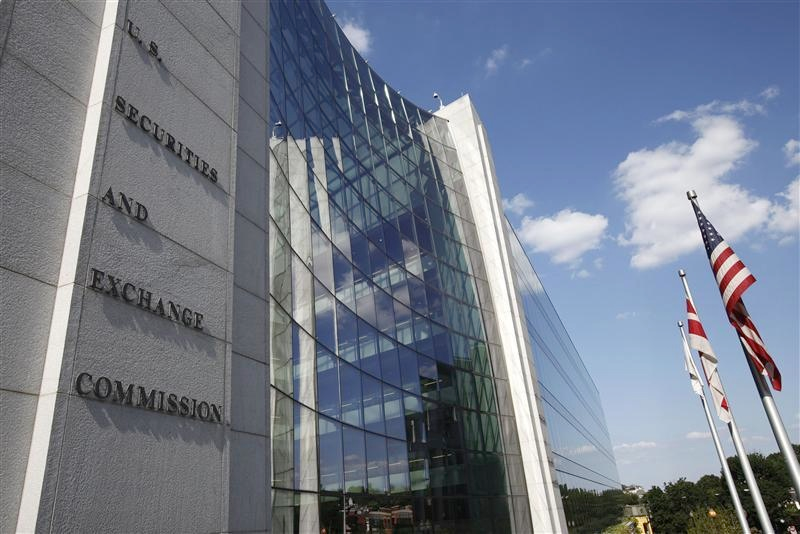BROWSE BY TOPIC
- Bad Brokers
- Compliance Concepts
- Investor Protection
- Investments - Unsuitable
- Investments - Strategies
- Investments - Private
- Features/Scandals
- Companies
- Technology/Internet
- Rules & Regulations
- Crimes
- Investments
- Bad Advisors
- Boiler Rooms
- Hirings/Transitions
- Terminations/Cost Cutting
- Regulators
- Wall Street News
- General News
- Donald Trump & Co.
- Lawsuits/Arbitrations
- Regulatory Sanctions
- Big Banks
- People
TRENDING TAGS
Stories of Interest
- Sarah ten Siethoff is New Associate Director of SEC Investment Management Rulemaking Office
- Catherine Keating Appointed CEO of BNY Mellon Wealth Management
- Credit Suisse to Pay $47Mn to Resolve DOJ Asia Probe
- SEC Chair Clayton Goes 'Hat in Hand' Before Congress on 2019 Budget Request
- SEC's Opening Remarks to the Elder Justice Coordinating Council
- Massachusetts Jury Convicts CA Attorney of Securities Fraud
- Deutsche Bank Says 3 Senior Investment Bankers to Leave Firm
- World’s Biggest Hedge Fund Reportedly ‘Bearish On Financial Assets’
- SEC Fines Constant Contact, Popular Email Marketer, for Overstating Subscriber Numbers
- SocGen Agrees to Pay $1.3 Billion to End Libya, Libor Probes
- Cryptocurrency Exchange Bitfinex Briefly Halts Trading After Cyber Attack
- SEC Names Valerie Szczepanik Senior Advisor for Digital Assets and Innovation
- SEC Modernizes Delivery of Fund Reports, Seeks Public Feedback on Improving Fund Disclosure
- NYSE Says SEC Plan to Limit Exchange Rebates Would Hurt Investors
- Deutsche Bank faces another challenge with Fed stress test
- Former JPMorgan Broker Files racial discrimination suit against company
- $3.3Mn Winning Bid for Lunch with Warren Buffett
- Julie Erhardt is SEC's New Acting Chief Risk Officer
- Chyhe Becker is SEC's New Acting Chief Economist, Acting Director of Economic and Risk Analysis Division
- Getting a Handle on Virtual Currencies - FINRA
ABOUT FINANCIALISH
We seek to provide information, insights and direction that may enable the Financial Community to effectively and efficiently operate in a regulatory risk-free environment by curating content from all over the web.
Stay Informed with the latest fanancialish news.
SUBSCRIBE FOR
NEWSLETTERS & ALERTS
Hedge Fund Advisor Failed to Prevent Trading on Insider Information - SEC
Deerfield Management Company, a hedge fund advisor, agreed to pay over $4.6 million in disgorgement, interest and penalties to settle SEC charges that it failed to prevent the misuse of inside information, including information about confidential government decisions.
The SEC notes that this case relates to insider trading charges that the SEC recently filed against current and former Deerfield analysts, a political intelligence analyst who passed them information, and an employee at the Centers for Medicare and Medicaid Services (CMS).
BACKGROUND. Deerfield, a New York, NY-based registered investment adviser (“RIA”) that’s been registered since 2012, provides advisory services in the healthcare sector exclusively to its associated funds. As of 12/31/14, Deerfield had around $6.4 billion in assets under management (“AUM”). It charges advisory fees of 1.75% and receives performance-based compensation of 20%.
SEC FINDINGS. From 2012 through 2014, Deerfield failed to establish, maintain, and enforce policies and procedures reasonably designed to prevent the misuse of material, nonpublic information, particularly taking into consideration the nature of Deerfield’s business. Deerfield conducted extensive research in the healthcare sector, which helped inform the firm’s investment decisions on behalf of hedge funds it advised. As part of this research, Deerfield engaged 3rd-party consultants and research firms, including firms that specialized in providing “political intelligence” regarding upcoming regulatory and legislative decisions.
Deerfield failed to ... adequately determine that research firms it retained were observing their own policies and procedures ("P&P") designed to prevent the disclosure of material, nonpublic information or any other information in breach of a duty.
- Deerfield imposed compliance requirements when its employees interacted with experts and expert network firms, but did not adopt similar safeguards for dealings with research firms.
-
Deerfield’s due diligence on research firms only required an initial review, to be refreshed “from time to time.”
-
Deerfield did not review the P&P of at least one research firm it retained from at least 2009 until early 2013.
-
When Deerfield finally obtained the P&P for that firm, it continued to retain the firm's services despite the existence of red flags.
-
The political intelligence analyst also served as that firm's CCO - an obvious conflict of interest.
-
Deerfield failed to ... enforce its policies and procedures related to receipt of material, nonpublic information.
-
Deerfield relied on its own employees to self-evaluate and self-report potential receipt of material, nonpublic information, but failed to adopt policies and procedures to ensure that its employees did so.
-
Deerfield received emails in 2010 and 2011 from a political intelligence analyst - several received by senior management - that contained insider information - but the firm did not act on these red flags.
-
Deerfield received emails between May 2012 and November 2013 from a political intelligence analyst that contained material, nonpublic information regarding CMS decisions.
-
The communications were not reported to senior management.
-
Deerfield traded on the information contained in these emails.
-
Trading on the information contained in these emails insider led to over $3.9 million in illicit trading profits, that translated to $714,000 of illicit fees and compensation to Deerfield.
-





